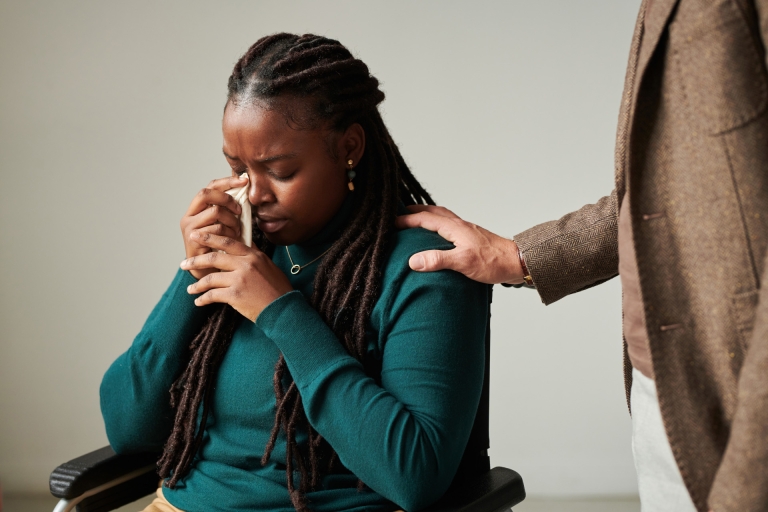Shock
The first stage for bereaved parents mostly includes shock and disbelief that something such tragically actually happened.

As we've mentioned earlier, our mission is to explain to you all the stages of a grieving process, which starts with shock.
It's no wonder that bereaved parents who have heard the news related to the loss feel absolutely shocked. In fact, you've probably found yourself completely in disbelief, not even your body knowing how to react.
In one of our blog posts, I have also explained that you can have a weird reaction to the sad news - some people find it so unbelieving that they even start to laugh or continue doing what they were previously working on as if nothing happened. This is also normal and not many people talk about it, but if you privately talk with other parents who have lost their children they'll admit you how it all went for them.
Shocking news, despite the age of a child (it can even be your grown-up child - there is no less pain related to a child's age), can make you scream, cry, and moan, but also shake and rapidly increase your heartbeat.
Now that I've mentioned increased heart rate, I also want to say that bereaved parents, in the first 72 hours of shocking news, can have higher rates of heart attack.
If you've heard of the syndrome "broken heart", that's exactly it. And yes, you can get ill and even die from sadness, so it's very important that someone has an eye on you in the first few days after receiving the shocking news and that you can take some care of your health.
I can't tell if this is the hardest period for grieving parents, due to the fact that you'll probably be completely numb, still not knowing what is going on. It feels impossible to accept what happened, yet you usually have many obligations to complete, mostly due to the funeral and telling other members of your family what happened.
When I mentioned telling the news to others, it would be better to ask a close person to be the one who'll tell others, if that is your wish and if it's too traumatic for you to talk about it.
Accept help related to the funeral organization if someone offers, or simply ask for help - trust us, it will be too exhausting for you to do everything on your own.
If you're someone who knows bereaved parents but hasn't lost a child yourself, thank you for reading this in the first place. If you want to help parents who have lost a child, you can offer some practical help as mentioned above. If they're suffering with finances, that'll help very much as well. If they want you to be there - be there. If they don't - don't take it personally. Everyone is dealing with their shock and grief in an individual manner.
What I also want to tell you is that there is no universal and "right" form of reaction and grief, despite how weird that fact sounds. Why am I telling this in the first place? Because when this phase is over, you'll start to rewind memories and start blaming yourself if you should have acted differently.
Physical distress you'll experience in this first stage can cause a lot of symptoms, including:
- hyperventilation
- dizziness
- stomach issues and IBS
- nausea
- heart palpitations
- insomnia
- numbness
- "electric shocks" through the body
- Headaches
More...
Therefore, in the shock stage of the grieving process, you'll mostly feel very lost which will be covered with various physical symptoms. Your body still cannot process all those information and emotions so you'll mostly be covered with self-protective detachment and various coping mechanisms just to get through the day.
How long does this last depends on various factors. Mostly, it ends in 3 to 6 months.
How to help yourself in this stage?
Here's what I think about this grieving process part when I take a look back:
1. Let yourself feel whatever you feel. And express it. Express your feelings and don't dig everything deep inside yourself. You have the right to feel whatever you are feeling. Your emotions can often be a mix of rage and desperation.
2. Don't worry so much about what others will think and say. Focus on yourself and your partner. You're in this together.
3. Create a daily plan and stick to it, as much as you can. I always say this, but it's truly very important - try to create any daily plan you can, so you follow the schedule of taking care of yourself and completing tasks such as eating, showering, or sleeping.
4. Ask for help or accept help if offered. Yes, you have every right to ask for help or accept it.
5. See a professional. If you are very lost or have suicidal thoughts, it's good to see a psychologist.
We are here for you...

